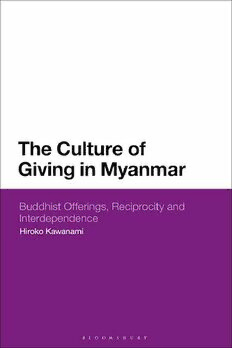
The Culture of Giving in Myanmar: Buddhist Offerings, Reciprocity and Interdependence PDF
201 Pages·2020·5.83 MB·English
Most books are stored in the elastic cloud where traffic is expensive. For this reason, we have a limit on daily download.
Preview The Culture of Giving in Myanmar: Buddhist Offerings, Reciprocity and Interdependence
Description:
How can people living in one of the poorest countries in the world be among the most charitable?In this book, Hiroko Kawanami examines the culture of giving in Myanmar, and explores the pivotal role that Buddhist monastic members occupy in creating a platform for civil society. Despite having at one time been listed as one of the poorest countries in the world in GNP terms, Myanmar has topped a global generosity list for the past four years with more than 90 % of the population engaging in ‘giving’ activities.In Myanmar, Buddhists enjoy a close relationship with the monastic community, helping with the running of local monasteries and offering daily alms. Monks reciprocate by conducting rituals, giving moral advice and admonition, and acting as mediators during local and even intra-familial disputes. However, discussions of Buddhist offerings have normally focused on the one-way flow of goods and services from the laity to the monastic community. This book extends observations of this relationship into an understanding of wider Buddhist cultures, and examines how deeply the reciprocal transactions of giving and receiving in society – or interdependent living – are implicated in the Buddhist faith.This book fills a gap in research on Buddhist offerings in Myanmar, and is an important contribution to the growing field of Myanmar studies.
See more
The list of books you might like
Most books are stored in the elastic cloud where traffic is expensive. For this reason, we have a limit on daily download.
